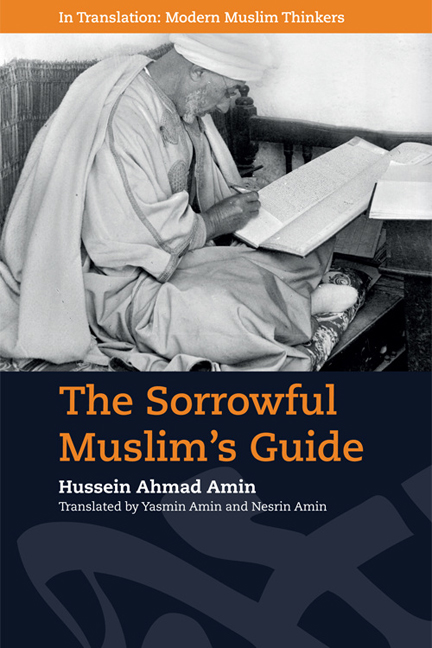Introduction – Hussein Amin: A Courageous Voice Calling for Reform
Published online by Cambridge University Press: 06 May 2021
Summary
Hussein Ahmad Amin was born in Cairo in June 1932, where he also passed away in April 2014. He was educated at schools in Egypt before graduating from the Faculty of Law at Cairo University. Following his legal training he studied English literature in London, and subsequently practised law and worked as a broadcaster for Egyptian radio as well as the BBC Arabic World Service. He went on to a career in the Diplomatic Service of the Egyptian Ministry of Foreign Affairs. Following this, while he was Deputy Director of the Diplomatic Institute in Cairo, Hussein Amin produced some of his major works, namely, Dalīl al-Muslim al-ḥazīn ilā muqtada-l-sulūk fī’l-qarn al-ʿishrīn (A Guide for the Sad and Perplexed Muslim Concerning the Sort of Behaviour Required by and in the Twentieth Century; translated here as The Sorrowful Muslim's Guide), and Ḥawla al-daʿwa ʾilā taṭbīq al-sharīʿa (On the Implementation of Sharia). Both books elicited severe reactions from the official religious establishment and generated intense debate not only in Egypt, but around the Arab world more widely.
Hussein's father, Ahmad Amin (1886–1954), was the first teacher of the young Hussein. Ahmad had studied the classical Islamic disciplines at al-Azhar, where he came into contact with Muhammad Abduh, whose reformist views deeply influenced him. Ahmad subsequently became a teacher, after which he studied law at the newly established (1907) Islamic Judicial School (Madrassat al-qaḍāʾ al-sharʿī’), which also profoundly affected him. After working as a judge, he became a professor at Cairo University, eventually becoming the Dean of the Faculty of Literature at the same university.
In later years, Ahmad Amin conceived of a combined work with Taha Husayn to chart the history of Islamic culture. Taha Husayn published the first book in the series in 1926, while Ahmad Amin published his wellknown works on the intellectual history of Islamic culture between 1933 and 1952. With respect to traditional production, these works stand out due to their subject, style and the sources used. In short, they are some of the most mature fruits of the Nahda, or Renaissance, that distinguished the Arab world at the end of the nineteenth century and beginning of the twentieth century. Soon the struggle for independence from colonialism and the nationalist and revolutionary regimes that followed would see a prevalence of apologetic and polemical works instead.
- Type
- Chapter
- Information
- The Sorrowful Muslim's Guide , pp. 1 - 10Publisher: Edinburgh University PressPrint publication year: 2018



